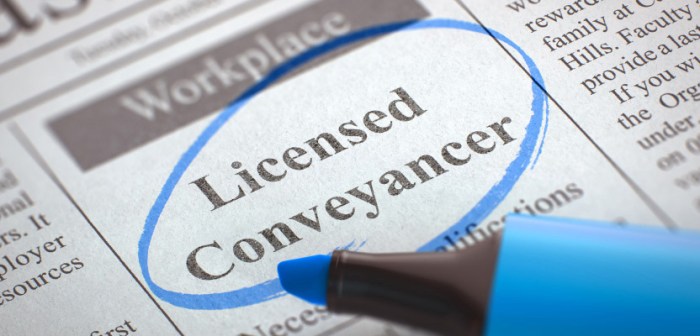Licensed conveyancers are essential professionals in the realm of property transactions. They act as intermediaries, navigating the complexities of buying, selling, or transferring property on behalf of their clients. Unlike solicitors, who possess a broader legal expertise, licensed conveyancers specialize in the intricate details of property law, ensuring a smooth and efficient process for their clients.
These highly trained individuals are equipped to handle all aspects of conveyancing, from initial contract negotiations to final property registration. Their expertise lies in understanding legal documents, conducting thorough property searches, and mitigating potential risks throughout the transaction.
What is a Licensed Conveyancer?

A licensed conveyancer is a legal professional who specializes in property transactions. They are responsible for handling the legal aspects of buying, selling, or transferring property, ensuring that the process is smooth and legally compliant.
The Role of a Licensed Conveyancer
Licensed conveyancers play a crucial role in property transactions by:
- Preparing and reviewing legal documents, such as contracts of sale, transfer deeds, and mortgages.
- Conducting property searches to ensure the title is clear and free from any encumbrances.
- Negotiating with parties involved in the transaction, including buyers, sellers, lenders, and real estate agents.
- Completing the necessary registration and filing requirements with relevant authorities.
- Providing legal advice and guidance to clients throughout the transaction.
Comparing Responsibilities with Solicitors
While both licensed conveyancers and solicitors can handle property transactions, their responsibilities and areas of expertise differ.
- Licensed conveyancers primarily focus on the legal aspects of property transactions, while solicitors can handle a wider range of legal matters, including family law, wills, and probate.
- Solicitors are qualified to represent clients in court, whereas licensed conveyancers are not.
- Licensed conveyancers are typically more specialized in property law, while solicitors may have a broader legal knowledge base.
Qualifications and Training
To become a licensed conveyancer, individuals must:
- Complete a recognized conveyancing course or degree.
- Gain practical experience working under the supervision of a licensed conveyancer.
- Pass a licensing exam administered by the relevant regulatory body.
- Meet ongoing continuing education requirements to maintain their license.
Benefits of Using a Licensed Conveyancer

Hiring a licensed conveyancer can significantly simplify the complex process of buying or selling property. These professionals are equipped with the knowledge and expertise to handle all aspects of the transaction, ensuring a smooth and stress-free experience for you.
Saving Time and Money
Licensed conveyancers can save you both time and money throughout the property transaction process. They handle all the necessary paperwork and legal procedures, freeing you from the burden of researching, completing, and submitting forms. This allows you to focus on other important aspects of the transaction, such as finding the right property or securing financing. Additionally, their expertise in property law and regulations can help you avoid costly mistakes or delays that could arise from navigating the process on your own.
Reducing Stress
Buying or selling property can be a stressful experience, especially when dealing with complex legal documents and unfamiliar procedures. Licensed conveyancers act as your trusted advisors, guiding you through every step of the process and answering your questions. They handle all the legal complexities, leaving you to focus on the exciting aspects of the transaction, such as finding your dream home or securing a great deal.
Legal Protection
Licensed conveyancers are bound by strict professional standards and regulations, ensuring that your interests are protected throughout the transaction. They are responsible for ensuring that all legal requirements are met and that the transaction is conducted fairly and transparently. This provides you with peace of mind knowing that your rights are protected and that the process is being handled by a qualified professional.
Expertise in Property Law
Licensed conveyancers have a deep understanding of property law and regulations, which is crucial for navigating the complexities of property transactions. They are familiar with the latest legal developments and can advise you on the best course of action for your specific situation. Their expertise can help you avoid costly mistakes and ensure that the transaction is legally sound.
Negotiation and Dispute Resolution, Licensed conveyancer
Licensed conveyancers are skilled negotiators who can represent your interests effectively during the transaction. They can negotiate the best possible terms for you, ensuring that your rights are protected and that you get a fair deal. They can also help resolve any disputes that may arise during the process, preventing costly delays and legal complications.
Choosing the Right Licensed Conveyancer

Selecting the right licensed conveyancer is crucial for a smooth and successful property transaction. You want to choose someone who is experienced, knowledgeable, and reliable.
Factors to Consider
When choosing a licensed conveyancer, there are several important factors to consider.
- Experience: Look for a conveyancer with a proven track record in handling property transactions similar to yours.
- Expertise: Ensure the conveyancer has expertise in the specific type of property transaction you are undertaking.
- Fees: Obtain clear and detailed information about their fees and payment structure.
- Communication: Choose a conveyancer who communicates effectively and promptly, keeping you informed throughout the process.
- Reputation: Check the conveyancer’s reputation by reading online reviews or seeking recommendations from trusted sources.
- Professionalism: Look for a conveyancer who is professional, organized, and attentive to detail.
Questions to Ask Potential Conveyancers
During your initial consultation, it’s essential to ask potential conveyancers specific questions to gain a better understanding of their services and approach.
- Experience in handling similar transactions: Inquire about their experience in handling property transactions similar to yours, such as the type of property, complexity, and location.
- Fees and payment structure: Discuss their fees and payment structure, ensuring clarity on all costs involved.
- Communication methods: Ask about their preferred communication methods and frequency of updates.
- Timeline for completion: Inquire about their estimated timeline for completing the transaction.
- Availability and responsiveness: Ask about their availability and responsiveness to your inquiries.
- Professional qualifications and memberships: Verify their professional qualifications and memberships with relevant bodies.
Finding a Reputable and Experienced Licensed Conveyancer
Finding a reputable and experienced licensed conveyancer requires thorough research and due diligence.
- Online directories: Utilize online directories specifically for licensed conveyancers, such as the Law Society of [Your Region] or the Conveyancing Association of [Your Region].
- Professional networks: Seek recommendations from trusted professionals in the real estate industry, such as estate agents or mortgage brokers.
- Online reviews: Read online reviews and testimonials from previous clients to gauge their satisfaction and experience.
- Initial consultations: Schedule initial consultations with several potential conveyancers to compare their services, fees, and communication style.
Choosing a licensed conveyancer is a crucial step in any property transaction. Their knowledge, expertise, and commitment to ethical practices can save clients time, money, and significant stress. By understanding the services they offer and the benefits they provide, individuals can confidently navigate the intricacies of property transactions with the assurance of a seamless and successful outcome.
Licensed conveyancers are legal professionals specializing in property transactions, handling the legal aspects of buying, selling, or transferring property. They can advise on matters like title deeds, contracts, and legal searches. While their focus is on property, it’s important to remember that they aren’t lawyers, and certain complex legal issues might require the expertise of a lawyer, such as a niw lawyer who specializes in immigration law.
Licensed conveyancers play a vital role in ensuring a smooth and legally sound property transaction.